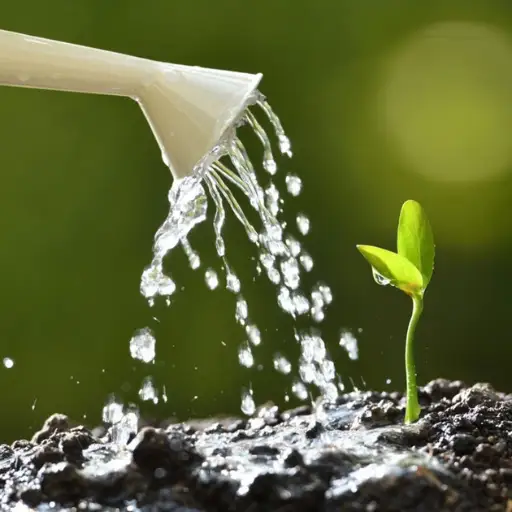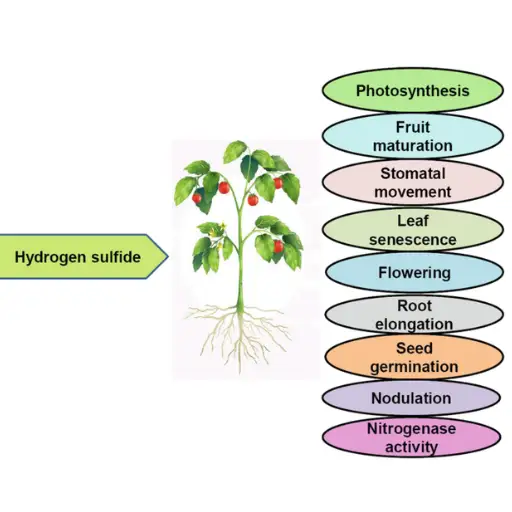In recent years, the role of hydrogen gas in crop production has emerged as a fascinating area of study in plant sciences. Hydrogen, traditionally recognized as a potential clean energy source, is now being examined for its beneficial effects on plant growth and development. This blog will explore how hydrogen gas can enhance crop resilience and productivity, focusing on its influence on important physiological processes and its potential as an innovative agricultural tool. We will delve into the latest research findings, exploring practical applications and the future implications of integrating hydrogen into sustainable farming practices. Through understanding hydrogen’s roles in plants, we gain insights that could revolutionize global food production systems, offering more sustainable and efficient solutions against the backdrop of climate change and growing population demands.
What Are the Roles of Hydrogen Gas in Plants?

How Is the Process Of Photosynthesis Affected By Hydrogen Gas?
The process of photosynthesis is improved by hydrogen gas because it enhances the action of photosynthetic pigments or some enzymes. Some studies have found that hydrogen gas can enhance chlorophyll activities of light-harvesting complexes resulting in increased light grabbing and conversion. Furthermore, such gas may also be involved in the regulation of gene expression pertaining to the photosystems, increasing effectiveness of the plant’s light energy to chemical energy conversion. In several ways, therefore, gaseous hydrogen enhances photosynthesis which is important in growth of the plants and plant productivity.
How Does Hydrogen Play a Role in the Key Processes of Glucose Metabolism?
Hydrogen gas plays an important role in glucose metabolism in plants by regulating major metabolic processes related to energy generation and storage within the plant. It is in fact useful in stimulating carbohydrate metabolism, thereby enhancing the glucose utilization efficiency of the plant. Hydrogen gas modifies the activities of enzymes that are important in glycolysis as well as the citric acid cycle, which results in metabolism of glucose to useable energy forms more optimally. By enhancing these metabolic activities, hydrogen gas does not only support energy generation processes within the plant but also aids in the regulation of energy flow and storage within the plant, thus enhancing growth of the plant as well as its sturdiness.
What is the impact of Hydrogen on the process of syndication of seeds?
The use of hydrogen gas helps to improve the seed germination process by improving the vigor of the seed and making the processes associated with germination to be quicker. Towards this end, the hydrogen gas works as a signaling molecule that induces a number of physiological and biochemical processes in the seed. This improves enzyme activities, alleviates stress, and increases energy supply which are all necessary for the early growth of the plant. Furthermore, hydrogen gas can reduce the effects of oxidative stress during germination and thus facilitate better seedling growth and establishment. Hence, the seeds which were treated with hydrogen gas increased in the rate of germination and their initial growth was also better than the untreated controls.
How Can Hydrogen Production Benefit Agriculture?
Different Ways of Generating Hydrogen for Plants
Presently, there are three best hydrogen production methods in the plants: The first is electrolysis which is ideally powered by renewable energy and refers to the splitting of water into hydrogen and oxygen. This technique has an edge relative to producing hydrogen – as it can be considered clean and sustainable. The second one is steam-methane reforming (SMR) which is another technique that more or less works and is more commonly employed than the former. Obviously, methane reacts with steam at high temperatures producing hydrogen, but unfortunately, this process is quite effective and efficient: the only downside of it is the carbon emissions which accompany SMR and usually make it less appealing environmentally unless there are some capture technologies in place. The last option is biological hydrogen generation through biological means such as algae and bacteria that can readily be a more viable option. Biological hydrogen generation has high promise for future integration in agriculture as it can complement existing agricultural methods leading to increased yields as well as environmental protection.
The production of renewable hydrogen has effects on the crops growing in the farms
It is through renewable hydrogen production that crop farming can be improved on greatly as it does bring on board the clean energy source needed to carry out relevant farm activities. The hydrogen obtaining energy from renewable sources like wind and solar in today’s market helps agriculture further sustainability objectives and helps lower the carbon emissions associated with farming activities. This clean hydorgen can be utilized in enhancing nitrogen fixation and reducing soil erosion which in turn improves food production and also increases resistance of plants to environmental factors. Besides, as hydrogen is integrated into agricultural systems, water management can be improved since oxygen produced during hydrogen fueled water electrolysis can be used for the proper aeration of water bodies, allowing for better growth of crops. In times when the agricultural industry is experiencing issues brought about by climate change and limited resources, renewable hydrogen remains one of the most effective ways of increasing productivity arid also sustains the environment.
Relationship between biomass and hydrogen production
As hydrogen fuel is produced with biomass, waste is used for hydrogen production. Biomass is made of plants and animals and can be transformed using gasification and pyrolysis into hydrogen. Processes that convert organic material at high temperatures and controlled conditions yield syngas, which is a mixture of hydrogen and carbon monoxide. This hydrogen is then recovered, purified, and utilized as a clean energy source. This strategy not only proposes a means of producing hydrogen sustainably, but also makes use of waste, hence promoting a circular economy. There are possibilities of using hydrogen from biomass for hydrogen production to lessen fossil fuel dependence and lessen emissions of greenhouse gases which is in agreement with global sustainability practices. The biomass to hydrogen thermal conversion process is attracting interest due to the fact that it has the potential to enhance renewable energy objectives and provide another energy generation route in the event that fossil fuels become scarce.
What Are the Effects of Hydrogen on Abiotic Stress in Plants?

Hydrogen aids in the alleviation of cold stress in plants
Hydrogen gas is within the signaling spectrum and can be used to alleviate the effects of cold stress in plants by improving their antioxidant defense mechanisms. Oxidative stress in plants at low temperatures can be caused by establishment of a thermal imbalance caused by an overabundance of reactive oxygen species (ROS). Hydrogen is essential for the stimulation of randomly distributed antioxidant enzymes within the plant cell that neutralize ROS and also alleviate cellular insult. Moreover, hydrogen is also associated with affirmative regulation of genes that control stress response, thus enabling optimum growth of the plant in adverse conditions. Such mechanism enhances the stress response of the plants thereby enabling them grow and be productive in sub-optimal temperature conditions.
Positive effects of hydrogen on oxidative stress
Hydrogen gas has been found to be very beneficial in lowering oxidative stress in plants by acting as an antioxidant. It assists in elimination of toxic substances, taking up free radicals such as ROS, to prevent destruction of cell parts. Subsequent to this protective action, there is hope of improved health and growth of the plant as lesser oxidative stress allows the plant to possess cellular equilibrium. Additionally, hydrogen gas plays its role in sustaining the stability of cellular components and enhances repair of oxidative injury, improving the overall stress tolerance of plants. As hydrogen gas helps enhance the antioxidant potential of the plants, it is able to maintain the functional abilities of the plants as well as enhance better growth and productivity in different environmental conditions.
Hydrogen helps antioxidant defense
Hydrogen is unique among the antioxidants in that it effectively scavenges reactive oxygen species (ROS) which are otherwise damaging to plant cells. This activity helps to achieve better plant growth and improved tolerance against environmental factors. Hitherto unpublished research reveals hydrogen also modulates antioxidant enzyme activities, thus improving the plants internal defence further. By advancing these defense systems, hydrogen makes sure that plants are able to retain cellular structure better and thereby normal biological functioning, leading to faster growth and higher productivity in a large variety of conditions.
What Is the Molecular Mechanism of Hydrogen in Plant Growth?

Hydrogen in Roots Formation
The phenomenon of root elongation and adventitious root initiation by hydrogen, in turn arises from hydrogen’s inherent abilities, particularly as a signaling molecule. It has a role in the upregulation of certain genes involved in root formation and development. In addition, hydrogen has the capacity to control the plant’s hormone called auxin, an important player in the processes of root formation and elongation. Thereby, hydrogen promotes the necessary hormone levels and gene expressions that allows for healthy root system architecture to be achieved. The improvement in root revenues assists reinforce most importantly the nutrient capture but also the amount of anchoring of the plant to the soil.
Impacts of hydrogen on reactive oxygen species
Hydrogen also seems to alleviate oxidative stress in plants, through regulating the levels of reactive oxygen species (ROS) within cells. It functions as a direct scavenger of free radicals and as an indirect supervisor of ROS production in plant cells. Through improving activities of the superoxide dismutase and catalase enzymes, hydrogen ensures that ROS are maintained at sub-lethal concentrations. Hydrogen signalling, in this case, activates antioxidant pathways, which enhance the plants’ natural defense systems. This combined effect not only protects plant tissues against oxidative injury but also contributes to the maintenance of plant health which enhances growth and adaptability of plants to a wide range of environment.
Interaction of hydrogen with nitric oxide in plants
It has been shown that the action of hydrogen and nitric oxide in plants is based on a sophisticated cell signaling network that has important implications for plant functions and stress management. Hydrogen plays a role in modulating the concentration of NO molecules which are important in several processes like root formation, stomatal response, and stress resistance. In particular, hydrogen can influence the amount of nitric oxide generated along different biosynthetic pathways. Such interaction enables the activation of a delicately balanced signaling response aimed at conferring cellular homeostasis and rapid response to external stimuli. Among the most important abilities of plant cells is the concentration of NO and its intermediary in crosstalk with hydrogen which is crucial for coordinating of antioxidant and hormonal signalling pathways aimed at improving growth and the ability of cells to withstand stress inducing factors.
What Are the Conflicts of Interest in Hydrogen Research?

Should people worry about the hydrogen made out of fossil fuels?
Yes, I do have worries regarding hydrogen produced from fossil fuels. The major problem is that this type of hydrogen, known as gray hydrogen, produces a considerable amount of carbon dioxide emissions in the process of its production. This defeats the purpose of using hydrogen, which is supposed to serve as a clean energy alternative. For example, the process of obtaining hydrogen from fossil fuels, such as natural gas, results in the emission of carbon dioxide and methane, both of which are potent greenhouse gases. Moreover, fossil fuels can support further use of non-renewable energy resources, which is even more dangerous for a society trying to shift to a clean energy system. For hydrogen to argue in favor of switching to clean energy, more emphasis should be on the methods of producing hydrogen that use renewable reservoir since they hardly produce emissions such as those caused by wind and solar.
What impact does renewable energy have on hydrogen research?
The landscape of hydrogen research is primarily influenced by renewable sources of hydrogen which are environmentally friendly and can be produced sustainably. When we talk of developing hydrogen technologies, it is now becoming attractive to obtain so-called ‘green hydrogen,’ from electrolysis by renewable sources such as wind, solar or hydroenergy. This is the process of water splitting using renewable energy-based electrolysis which breaks water molecules into the hydrogen and oxygen atoms, which involves no harm to the environment. By tapping into these forms of energy, we are minimizing the use of fossil fuels and transforming the orientation of hydrogen-based research toward clean energy. This transformation helps to lower the total carbon footprint significantly and enhances the transition to a sustainable energy system though some adaptive pathways are to be defined and implemented.
Special issues for hydrogen in agriculture
When talking about the agricultural sector, several special aspects regarding hydrogen need to be addressed. To begin with, the cost of generating green hydrogen on a commercial scale still poses as an obstacle because the technology requires a lot of capital outlay. This discourages the uptake of the hydrogen solutions by most farmers, particularly in the case of smaller operations that are not viable. Additionally, services for storing and transporting hydrogen are poorly developed, which creates problems when it comes to supplying hydrogen to agricultural regions. Technological development is, however, necessary to the extent that hydrogen needs to be incorporated into agricultural processes such fuel for agricultural machinery or for making fertilizers. However, if the discussed issues are addressed, hydrogen seems promising because its environmental benefits such as, for example, cutting emissions originating from traditional agricultural energy sources are great.
Reference sources
- Progress in the study of biological effects of hydrogen on higher plants and its promising application in agriculture – This article discusses the biological effects of hydrogen on higher plants and explores its potential applications in agriculture.
- Roles of hydrogen gas in plants: A review – This review covers the various roles of hydrogen gas in plants, including its impact on plant growth and development stages such as seed germination and root development.
- Hydrogen peroxide affects plant growth promoting effects of Azospirillum – This study examines how hydrogen peroxide influences plant growth, particularly in combination with Azospirillum, a plant growth-promoting bacterium.
These sources should provide a solid foundation for understanding the feasibility and benefits of hydrogen in crop production.
Frequently Asked Questions (FAQs)

Q: How does hydrogen work in plants?
A: Hydrogen is important in many physiological activities in plants, such as the growth and development of these plants. It serves as an authentic molecular messenger that aides in the modulation and coordination of many signaling pathways in the plant.
Q: In what forms hydrogen are utilized by plants?
A: Plants utilize hydrogen mostly in hydrogen-rich compounds forms that are needed for the production of other important biomolecules. Other than that, hydrogen helps in glutathione metabolism, which is also an important antioxidant in plants for controlling oxidative stress.
Q: What are the effects of hydrogen water on plants?
A: Hydrogen water increases tolerance to cadmium in plants enabling them to withstand greater heavy metal stress. Other benefits of hydrogen water include improved growth parameters, increased antioxidant activity, and better overall health of the plant.
Q: How does electrolysis work to produce hydrogen for agricultural use?
A: Hydrogen can be produced from water on large scale and small scale using many different methods. For example, electrolysis is used to separate water molecules into hydrogen and oxygen. This hydrogen produced can then be used in farming systems to enhance and support plant growth and productivity.
Q: What are the possible effects that hydrogen sulfide has on plants?
A: Hydrogen sulfide aids or harms the plants depending on the amount present. In low amounts, the compound can stimulate growth and tolerance against stress; however, when the concentrations are elevated, it could be poisonous and disrupt the physiological processes within the plants.
Q: What hydrogen has the effect on glutathione metabolism in plants?
A: Hydrogen affects glutathione metabolism by stimulating the synthesis of this key antioxidant. This activity assists plants in coping with oxidative stress and protecting the cells from damage in the organism, in particular in unfavorable factors of the environment.






